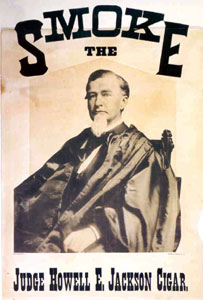
Howell Edmunds Jackson
U.S. senator (1881-86), Sixth Circuit Court (1886-92), Sixth Circuit Court of Appeals (1892-93), and associate justice of the U.S. Supreme Court (1893-95), Howell E. Jackson was best remembered for his role in the Pollock Income Tax Decision of 1895. He was the second of six children born to Dr. Alexander Jackson, a prominent Whig politician and planter, and his first wife, Mary Hurt. In 1840 the family moved to Jackson, where young Howell attended Jackson Male Academy and West Tennessee College. He finished his education at the University of Virginia and Cumberland Law School in Lebanon, where he graduated in 1856. Opening his legal practice in Jackson in 1857, his first recorded case involved the implied warranty on the health of a slave.
Relocating to Memphis in 1857, Jackson opened a partnership with future Confederate congressman David Currin. In 1859 Jackson married Sophia Molloy; their fourteen-year marriage produced five children. Notwithstanding his Unionist Whig sympathies, Jackson secured appointment as Confederate receiver of sequestered property for the Western District of Tennessee in October 1861. He held this position until the fall of Memphis in June 1862, after which he made several unsuccessful attempts to secure a judicial commission in the Confederate army. Jackson and his family spent the remainder of the war as refugees in LaGrange, Georgia.
Jackson returned to Memphis at war’s end and in 1866 secured a formal pardon from President Andrew Johnson. With the subsequent dismissal of charges of treason, Jackson was instrumental in helping Nathan Bedford Forrest post bond in a case involving similar charges. He practiced business and corporate law in Memphis until 1874. Jackson lost his first wife during the Memphis yellow fever epidemic of 1873, and thirteen months later he married Mary Harding of Belle Meade Plantation. This marriage produced three children.
Following his marriage, Jackson relocated to Jackson and entered a legal partnership with former Confederate general Alexander Campbell. In 1875 he was appointed to the state Court of Arbitration. Three years later, he made a strong but unsuccessful effort to secure nomination to the Tennessee Supreme Court. A postwar Democrat, Jackson became associated with the anti-repudiation “State Credit” faction of the party during the controversy over payment of the state’s postwar debt. In 1880 Jackson won election to the state legislature. When an evenly divided legislature deadlocked on the selection of a U.S. senator, Jackson was chosen as a compromise candidate by a bipartisan coalition of Democrats and Republicans.
Taking office on March 4, 1881, he spent the next five years supporting such issues as restriction of Chinese immigration and the creation of the Interstate Commerce Commission. He also favored internal improvements, a lowered tariff, and civil service reforms. A member of the Committees on Pensions and Claims, Jackson occasionally clashed with Indiana Republican Benjamin Harrison on the issue of granting pensions to able-bodied veterans. During his final year as a senator, Jackson took a prominent role in the campaigns to increase presidential power over federal appointments and to secure federal aid to state education.
Democratic President Grover Cleveland appointed Jackson to the Sixth Circuit Court in April 1886. He rendered roughly ninety opinions during his seven years on the bench; his most notable decision in the 1892 case of In re Greene later served as the constitutional basis for the Supreme Court’s 1895 decision limiting the power of the 1890 Sherman Anti-Trust Act in E. C. Knight.
In 1892 Jackson was elevated to the Sixth Circuit Court of Appeals, where he served with future president William Howard Taft. Upholding the authority of federal agents to enforce civil rights law in United States v. Patrick (1893), Jackson positioned himself to become the last important judicial appointment of outgoing Republican President Benjamin Harrison. Formally sworn in as an associate justice of the U.S. Supreme Court on March 4, 1893, Jackson was stricken with tuberculosis shortly after the Court’s first term. Authoring just forty-six opinions and four dissents, he nevertheless left a strong record of growing opposition towards government regulation of the economy. Leaving his death bed in May 1895 to participate in the rehearing of Pollock v. Farmer’s Home Loan, Jackson authored an opinion sustaining the constitutionality of the 1894 federal income tax, an action which proved futile when the Court majority invalidated the measure. Returning to his West Meade home in Nashville after the Court’s decision, Justice Jackson died on August 8, 1895.
Suggested Reading
Terry Calvani, “The Early Legal Career of Howell Jackson,” Vanderbilt Law Review 30 (1977): 39-72; Harvey G. Hudspeth, “Howell Edmunds Jackson and the Making of Tennessees First Native-born Supreme Court Justice,” Tennessee Historical Quarterly 58 (Summer 1999): 140-55; Melvin I. Urofsky, The Supreme Justices: A Biographical Dictionary (1994)



